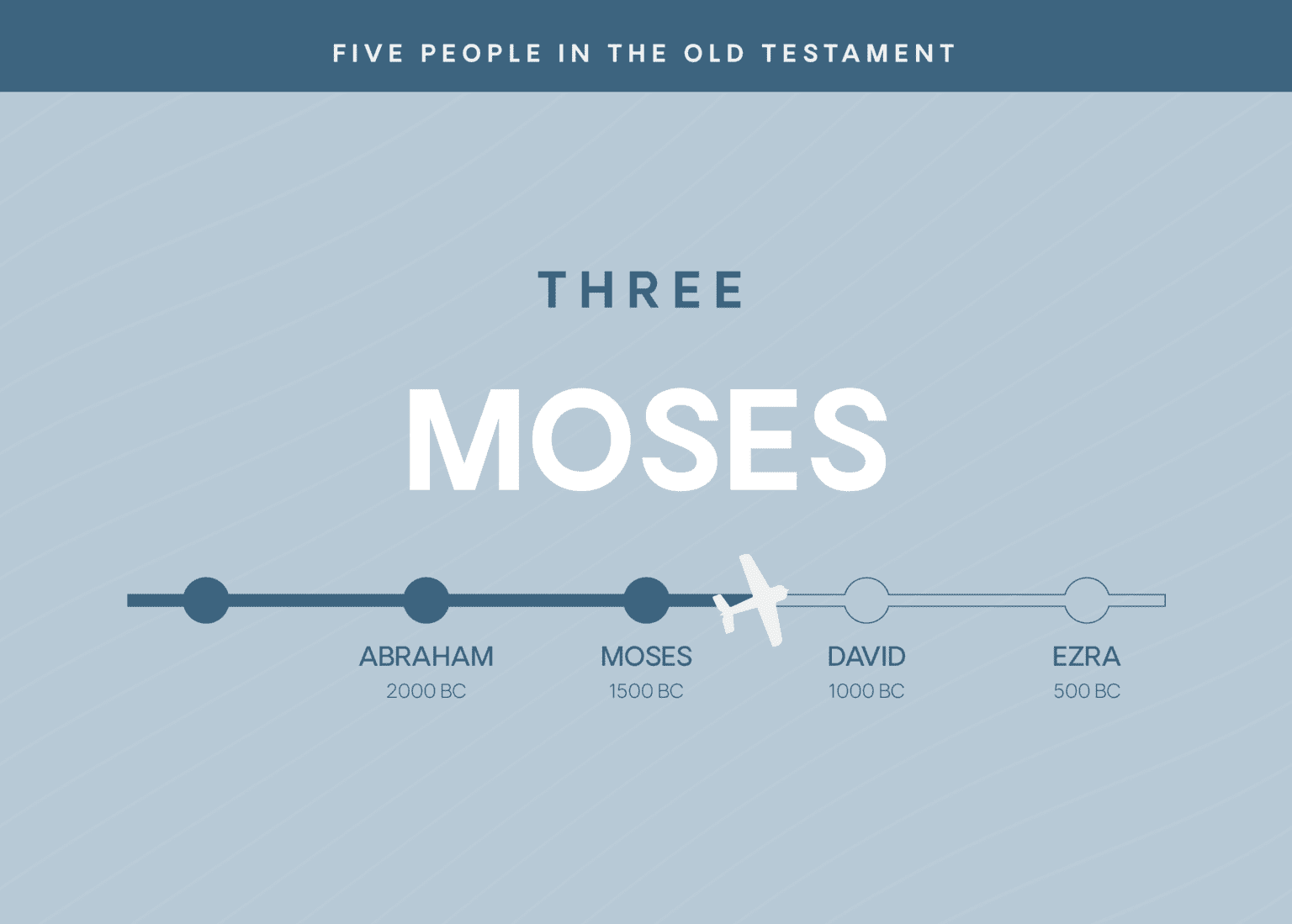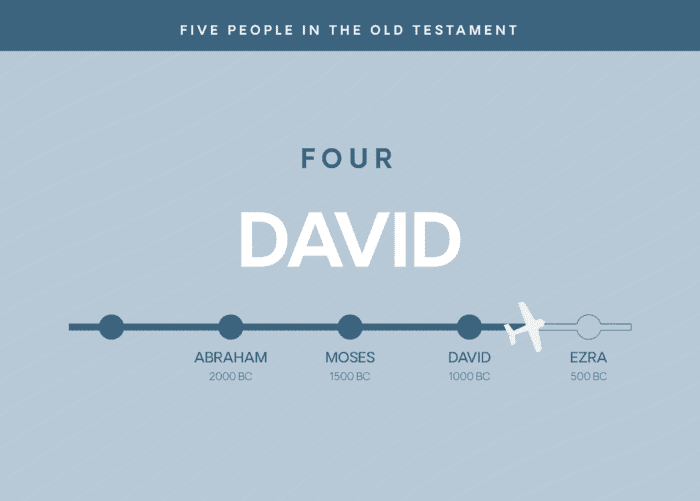
FLY Through the Bible
3. Moses

Moses’ life was in danger from the moment he was born. In a despicable act of ethnic cleansing, Pharaoh instructed his people to throw every male child descended from Abraham into the Nile river (Exodus 1:22). But Moses’ mother came up with a plan to save her son. She put him in a basket and hid him in the reeds at the edge of the river.
One day, Pharaoh’s daughter came down to the river to bathe. She found the basket and, taking pity on the infant inside, she brought Moses home and raised him in the palace. Moses grew up surrounded by every luxury money could buy, but he knew that he did not belong in the palace. He belonged to the line of Abraham, and his people were in trouble. So, he left the palace and identified himself with the people God had promised to bless.
God commissioned Moses to bring His people out of Egypt and lead them into the land He had promised (Genesis 12:7). By this time, the descendants of Abraham numbered 600,000 men (Exodus 12:37), so the entire community would have been about two million people.
These men were Pharoah’s workforce, so at first, he refused to let them leave. But after a series of plagues that God sent through Moses, he relented and let God’s people go (Exodus 12:31). But, after they left, Pharaoh changed his mind again and sent his armies after them.
When the people came to the Red Sea, it seemed that they were trapped. But God made a path for them through the sea.
Then Moses stretched out his hand over the sea, and the Lord drove the sea back by a strong east wind all night and made the sea dry land, and the waters were divided. And the people of Israel went into the midst of the sea on dry ground, the waters being a wall to them on their right hand and on their left. (Exodus 14:21–22)
But when the pursuing army tried to cross, God caused the wall of water to collapse over them. God’s people knew that they had been saved from certain destruction by a miracle that only God Himself could have performed.
God gave Moses the Ten Commandments
After this great deliverance, Moses led the people to Mount Sinai where God gave them the Ten Commandments.
And God spoke all these words, saying,
“I am the Lord your God, who brought you out of the land of Egypt, out of the house of slavery.”
-
- You shall have no other gods before me.
- You shall not make for yourself a carved image, or any likeness of anything that is in heaven above, or that is in the earth beneath, or that is in the water under the earth.
- You shall not take the name of the Lord your God in vain.
- Remember the Sabbath day, to keep it holy. Six days you shall labor, and do all your work, but the seventh day is a Sabbath to the Lord your God.
- Honor your father and your mother, that your days may be long in the land that the Lord your God is giving you.
- You shall not murder.
- You shall not commit adultery.
- You shall not steal.
- You shall not bear false witness against your neighbor.
- You shall not covet your neighbor’s house; you shall not covet your neighbor’s wife, or his male servant, or his female servant, or his ox, or his donkey, or anything that is your neighbor’s.” (See Exodus 20:1–17)
These commandments are a direct reflection of the character of God, and God calls His people to live a life that reflects who He is. Why should you not commit adultery? Because God is faithful. Why should you not steal? Because God can be trusted. Why should you not lie? Because God’s Word is truth.
The Ten Commandments also spell out what it means to love. The first four commands tell us what it looks like to love God. Loving God involves putting Him first, embracing Him as He is, honoring His name, and giving Him time. The last six commands tell us what it looks like to love our neighbor. Loving others involves giving honor where honor is due, acting in the best interest of others, being faithful, giving rather than taking, telling the truth, and rejoicing in what God has given to others.
God gave Moses the sacrifices
A world where these commands are always fulfilled would be supremely good. But while Moses was receiving the Ten Commandments at the top of the mountain, God’s people were breaking them at the bottom of the mountain.
In Moses’ absence, his brother, Aaron, made a golden idol in the shape of a calf, and the people said, “These are your gods, O Israel, who brought you up out of the land of Egypt” (Exodus 32:4). So, God said to Moses, “Go down, for your people, whom you brought up out of the land of Egypt, have corrupted themselves” (Exodus 32:7).
God’s people had broken the first commandment. Moses called them to repent, and the vast majority of them did. But some- thing more was needed before they could be forgiven. An offense had been committed and a price would have to be paid. According to Hebrews 9:22, “Without the shedding of blood there is no forgiveness of sins.”
When God gave the laws, He also gave the sacrifices to His people. Forgiveness and restoration were always in the mind and the heart of God, and the sacrifices meant that God’s people were saved from facing the full penalties of the law.
Even at this early stage in the Bible story, God is preparing us for the coming of Jesus. The sacrifices in the Old Testament show why the Son of God had to come into the world. Jesus did what the sacrifice of animals could only point to. He made atonement for our sins, and forgiveness is found through faith in Him
Questions for Reflection and Discussion
Details
Next

4. David

Take the First Step to Open Your Bible
Join 35,000+ people who get ‘Open Weekly’. Every Wednesday, you’ll get hand-picked resources designed to inspire, encourage, and challenge you in opening your Bible.
Join Pastor Colin In-Person!
Do you want to understand the Bible story? 📖
Pastor Colin Smith’s upcoming event FLY THROUGH THE BIBLE, is a high-altitude exploration of the entire Bible story. This brief introduction to the Bible will help you grasp who God is, who you are, who Jesus is, and what He offers to you!
Coming to 4 cities this fall:
- St. Louis, Missouri
- Twin Cities, Minnesota
- Des Moines, Iowa
- Indianapolis, Indiana
Will you join us?

It looks like you're viewing the site from outside the US. Click below to visit our UK site or close this pop-up to view the international site.